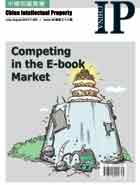The history of Apple Inc. is perhaps also a history of trademark disputes, which constantly arouses concern just as its latest stylish digital products. The Tablet personal computer IPad invited trouble soon after its release. Since the Shenzhen-based Proview LED Lighting Co., Ltd. registered the “IPAD” trademark for category-9 products including computers and TV sets as early as in January 2000, Apple had to discuss with them for a transfer. However, another company, the Shenzhen Great Loong Brother Industrial Co., Ltd., rushed out midway and claimed to have purchased the “IPAD” mark, saying, “We would like to put a price higher than Apple’s.” Shortly after, however, on May 14, 2010, Great Loong received a notice from Apple, saying Proview agreed to sell and transfer IPad and Apple has the right to be the assignee; Great Loong must bear the risk if it decides to purchase the trademark.
Actually, Apple contracted a trademark headache as early as in 1980, when George Harrison, a member of the Beatles, noticed an Apple computer advertisement on a magazine and believed it would cause a trademark dispute with the Apple Corps established by the Beatles in 1968. The two parties reached an agreement in 1981, which allowed Apple to use the name but restricted it to computers, while the Beatles continued its efforts in entertainment.
The two sides clashed again in 2003 when Apple launched iTune, with Apple Corps claiming that Apple Inc. encroached in its field. After a series of lawsuits they reached an agreement in 2007. Apple Inc. obtained total control over the “Apple” brand and authorized Apple Corps to continue to use certain marks.
Apple’s I-series products also plunged it into a trademark war. In January 2007, Apple launched in high profile its new mobile iPhone, and was sued only one day later by Cisco Systems, who claimed that iPhone infringed its trademark rights. The two sides later reached an agreement, according to which both can use iPhone trademark freely on their respective products worldwide. However, in China, Apple faced the same problem. Hanwang Technology registered “Iphone” as early as in 2004, and Apple had to purchase it for USD 3.65 million in July 2009.
Now, it seemed that Apple had to pay for Ipad. Within a month of release, 1 million IPad computers had been sold, and it would be sold in nine countries other than America and China by the end of May 2010. IPad will encounter legal obstacles in China if the trademark problem remains unsolved.
As an international giant, Apple is certainly not ignorant about trademark. As a common practice in trademark management, when starting a new mark, Apple should conduct a search in the object country or region to avoid disputes and either change a mark or buy it in case of clash.
Apparently, Apple will not give up easily its insistence on and preference to marks starting with the letter I, and in China alone it has registered I M A C, I P H O T O, I T U N E S, I B O O K, I M O V I E, IPOD, IDVD, IPHONE, IWORK, ILIFE and I P A D. John Daniel, a partner of K r a m e r L e v i n Naftalis & Frankel LLP said: “Initial I is something Apple has been working on, and losing it will be a misfortune.”
Apple’s I products have won numerous fans, and also laid down hidden perils in trademark, because it is simply impossible for the company to control or register all I-starting marks worldwide. Since these marks lack distinctness and are eye-catching, others can also hit them if Apple can. IPhone and IPad have proven that.
Fortunately, Apple has the money to buy. Unfortunately, because it is Apple, the seller often wants to ask for an inflated price. If Apple sticks to the I strategy, it will most probably find the next I-starting mark in another’s hand.
In fact, there is a possibility that professional trademark pirates are digging the next I-starting mark and waiting for Apple to bite.




